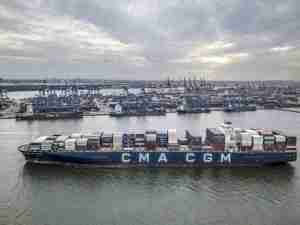Loading of bulk goods such as sugar and grains grinds to a halt in even the lightest rain shower, as the moisture can damage cargo, disrupting port and shipping schedules and increasing ship rental and docking fees.
At Brazil's southeastern sugar and grains port Paranagua recent bad weather has exacerbated queues already weeks long to load sugar.
"It's a piece of equipment conceived so that the port can run 24 hours a day. In sun, it protects the environment from dust and in rain, protects the load," said Nildon Pereira, chief executive of ETEC, the company he co-founded in 2004 specifically to develop the idea.
Pereira plans to install a prototype in Paranagua in November and has a firm order for another from a private firm at Santos port, Brazil's largest.
He estimates shipping costs are increased on average by $2.6 billion dollars each year in Brazil because of weather-related stoppages, including extra warehousing and road transport costs.
The 'Ecoloading' system is a tent-like canopy that drapes down from the ship loader and fastens to the deck with magnets.
But what makes an otherwise simple idea practicable is how it can flex as the ship loader spout moves around.
A circular metal frame attaching the tarpaulin to the ship loader features computer controlled motors to reel in the surplus fabric as the spout moves one way, while letting more out on the other side to prevent stretching and tearing.
It also has inflatable chambers to provide rigidity so rain water will run off it and not build up on top and potentially cause the sheet to fall into the hold, addressing a problem that plagued attempts by previous designers.
"There have been several frustrated attempts and they ended up losing cargo. It breaks and the water falls in. They have lost loads of sugar and soymeal this way," Pereira said.
Coming Soon?
Pereira said he would invest and expand gradually according to firm orders for the equipment. He said Bosch had given the firm a credit line for the electric motors it had already supplied, Pereira said.
Firms in Russia, Croatia, Canada, Argentina and Chile said they intended to buy some units, he said.
"It's ready for the market. We just need financing support or some kind of partnership," he said, if the company is to scale up production beyond a piecemeal scale.
ETEC's brochure for Ecoloading primarily touts the environmental and health benefits of using the equipment rather than its all-weather capability. It prevents dust from sugar, flour and grains from escaping from the hold.
"Port workers end up breathing this in as well as the population that lives near the port. It dirties their houses," Pereira said. He estimated potential global demand at 3,000 to 4,000 units and the unit price around 3 million reais depending on specification. (Reuters)
The tarpaulin contains fibers used in bullet-proof jackets with carbon thread to prevent sparks from static electricity. Build up of inflammable gases is avoided by ventilation that escapes through special sleeves that keep water out.
"People have been talking about something like this for 20 years," said Luiz Teixeira da Silva, head of operations at Paranagua port.








